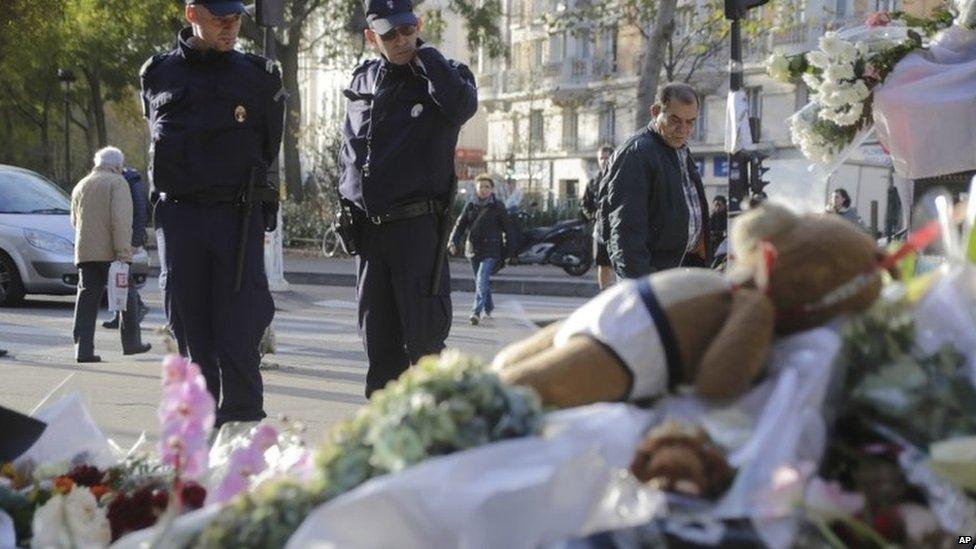Syria: Why the mood among MPs is changing
- Published

Attacking Islamic State as an act of self-defence is seen differently in the wake of the Paris atrocities
David Cameron has yet to publish his new plan for extending military action to Syria but his team are already making the case in the House of Commons.
I have been told that this afternoon Defence Secretary Michael Fallon has been briefing Labour MPs alongside one of his top military aides, Lieutenant General Gordon Messenger, the Deputy Chief of the Defence Staff (Operations) who commanded British forces in Helmand.
Mr Fallon is also planning to brief Labour MPs collectively at an open meeting in a couple of weeks' time, followed by another briefing for Tory MPs.
And while Downing Street is still insisting that there is no guarantee there will be any vote over military action, that the prime minister will act only if he is absolutely certain of winning that vote, ministers believe the momentum is moving their way.
One Cabinet minister told me: "Yesterday was a game-changer. You could see the middle rank of Labour MPs, particularly the women, nodding along with the PM. Afterwards, he was bouncing. He really thinks the mood has changed."
And, having spent the morning talking to MPs at Westminster, that minister may be right. So what has changed?
For many MPs, the Paris attacks have changed the calculation. One Conservative who has, thus far, been sceptical said: "The mood has changed. Before they were asking for us to intervene in a civil war, now it is more an act of self-defence against an aggressor." MPs say that if Mr Cameron makes clear that RAF jets will be targeting so-called Islamic State targets in Syria, they would be much more willing to support him.
President Putin's demarche following the downing of the airliner over Sinai and the diplomatic talks in Vienna has also changed some MPs minds, particularly Conservatives'. They appear far more willing to support military action in Syria if there is some kind of deal with Russia beforehand: at the very best, joint action against so-called Islamic State; at the very least, rules of engagement to avoid British jets clashing with Russia's. That is what many Tory MPs will be looking for in the written response Mr Cameron gives to the Commons foreign affairs select committee in the coming days.
The disarray and division on the Labour benches over Syria has also seen by some in Downing Street as a political opportunity. In the summer, following Jeremy Corbyn's election, Labour MPs told me they were reluctant to vote against their whip on a matter as important as war and peace simply to spite a new leader whose election they opposed. But now they say that they are more willing to vote against Mr Corbyn because they feel he is leading them in the wrong direction on an issue of huge national importance that is putting Labour, they believe, at odds with the public mood.
Some believe they see the hand of George Osborne stiffening Mr Cameron's resolve. On Monday Mr Cameron was still telling reporters in Turkey that "it is perfectly right to say that a few extra bombs and missiles won't transform the situation". But on Tuesday he talked of chopping off "the snake's head" that is Islamic State. One Westminster source who has been in contact with Downing Street in recent days claimed that Mr Osborne "had a rush of blood to the head" over the drubbing Jeremy Corbyn had over Syria at a meeting of the parliamentary Labour party on Monday night. Of course, this is denied by Mr Osborne's friends who say the chancellor has always been engaged.
As for the numbers, ministers reckon the 30 Conservative opponents of extending military action to Syria can be squeezed down to about 20. They are hopeful of similar numbers of Labour MPs backing them and even more abstaining.
The prime minister said the UK faced "a direct and growing threat"
The key aim for the Conservative whips is to try get enough mainstream Labour MPs onside for the government's policy rather than relying on old Blairites to stick it to Mr Corbyn.
Also crucial will be the role of the eight Democratic Unionist Party MPs.
Back in September, the DUP leader at Westminster Nigel Dodds firmly opposed military action in Syria.
But I note the way Mr Cameron praised Mr Dodds in the House of Commons yesterday and Tory ministers tell me they are hopeful of winning DUP support.
One DUP source said: "We wait and see: if the PM makes a credible case for what the use of British military force can realistically achieve, we could of course support that."
As one Cabinet minister told me: "There is now a confluence of events and stars in our favour. I think we can do this."
Maybe. But only if Downing Street is absolutely sure they will win.
- Published18 November 2015